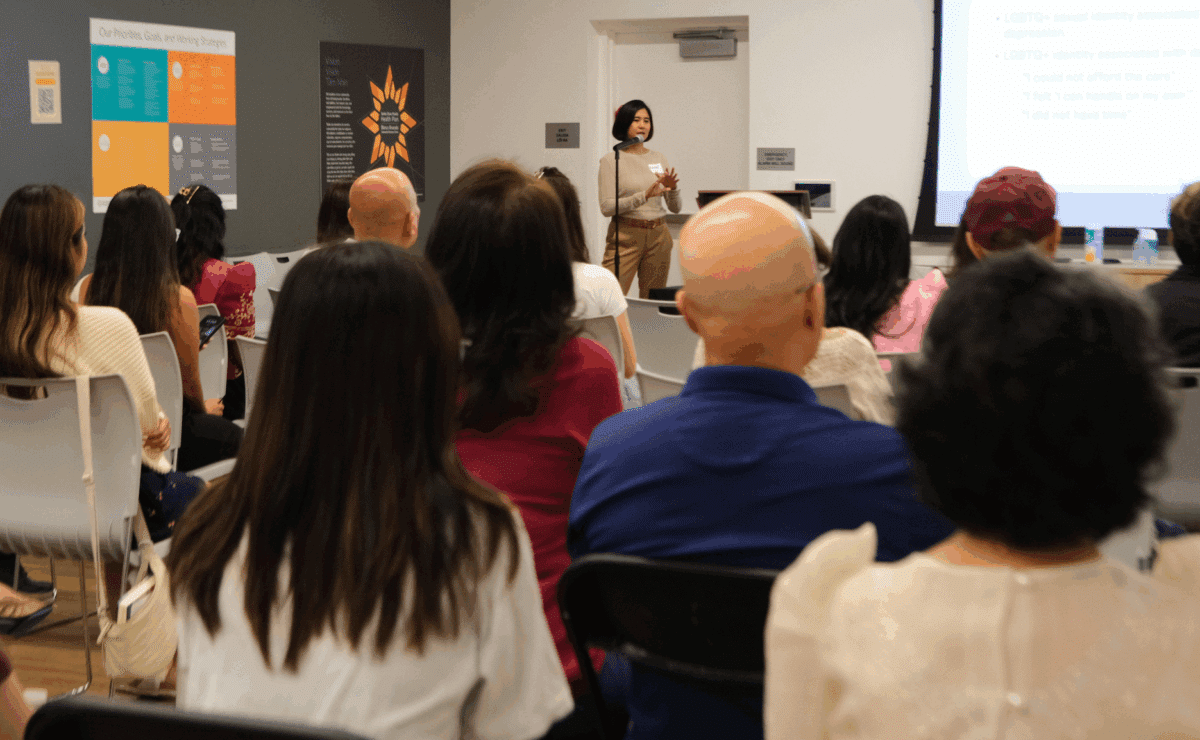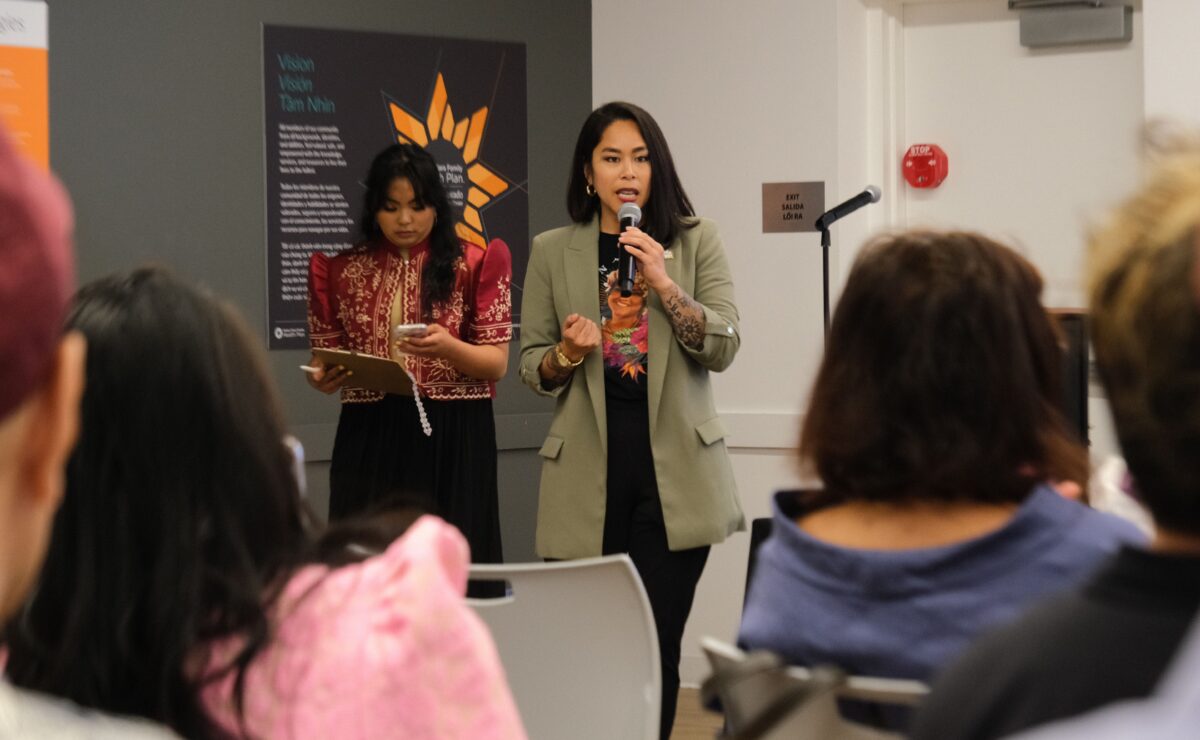Study reveals why Filipino Americans avoid life-saving cancer screenings

Dr. Rachel J. Mesia of Stanford Cancer Institute speaks to community members during the briefing. Photo from LEAD Filipino
LOS ANGELES – A groundbreaking study in Santa Clara County, California, reveals that Filipino Americans are delaying or avoiding critical cancer screenings due to fear, cost and a lack of culturally tailored information – factors researchers say are fueling health disparities in one of the state’s largest ethnic communities.
The five-year study — conducted by San Jose-based nonprofit LEAD Filipino in partnership with the Stanford Cancer Institute – is the first comprehensive cancer research initiative focused on Filipino Americans in Santa Clara County and only the second of its kind in the US.
It surveyed hundreds of residents, hosted community outreach events and uncovered troubling trends in cancer risk behaviors and healthcare access.
“We heard the same thing again and again – people knew which screenings were recommended, but fear, financial strain and cultural stigma kept them from getting checked,” said Dr. Angelica Cortez, founder and CEO of LEAD Filipino. “This research puts numbers to what we’ve long known in our hearts: our community is being left behind.”

LEAD Filipino founder and CEO Dr. Angelica Cortez shares with community members findings from the organization’s cancer research initiative done in collaboration with Stanford Cancer Institute. Photo from LEAD Filipino
Key findings
Key findings of the study include:
Delayed screenings: One in three respondents reported postponing cancer screenings – including mammograms, colonoscopies, and cervical exams – despite knowing their importance. Awareness didn’t always lead to action.
Behavioral risks among young adults: Adults aged 18–25 reported high nicotine use, while those aged 26–39 reported frequent binge drinking (4–5 drinks per outing, weekly).
HPV awareness gap: Filipino men showed significantly lower awareness of HPV and its links to cancer.
Cultural barriers: Cultural values like hiya – a Filipino concept of shame or modesty – prevented many older adults from discussing health issues, even in anonymous surveys.
The initiative marks only the 17th peer-reviewed publication in US medical literature that focuses on Filipino American cancer outcomes – despite the group’s sizable population (1.5 million in California alone) and strong representation in the healthcare workforce.
“We show up in hospitals, clinics and homes as caregivers – but we’re missing in the data,” said Dr. Cortez. “This study is about making our stories visible and making our health a priority.”
The research provides critical insights into Filipino American attitudes around diet, lifestyle, screenings and healthcare access – data researchers say is sorely needed. Most US health data still reflects outcomes from white or Caucasian patients, often overlooking the nuanced needs of other racial and ethnic groups.
Santa Clara County is home to nearly 150,000 Filipinos – the third-largest Filipino population in the US – yet health data specific to this community remains scarce, hindering effective public health interventions.
The study used a grassroots approach. Led by community organizers and emerging healthcare leaders, LEAD Filipino partnered with churches, cultural festivals, and events such as the “Fly Pinays Summit” and “Queer Lakbay Conference” to build trust and collect firsthand data.
LEAD Filipino
LEAD Filipino is a national nonprofit advancing civic engagement, health equity and grassroots organizing in Filipino and broader Asian American Pacific Islander (AAPI) communities.
Founded in 2015 and headquartered in Silicon Valley, the organization has chapters in San Antonio and Las Vegas. Its work blends art, culture and advocacy to drive civic education, political participation and economic development.
Notable achievements include launching the first Filipino cancer survey in Santa Clara County, helping establish Delano Manongs Park in East San José and co-producing the first Filipino Advocacy Day in Sacramento with the FIERCE Coalition.
“We look at healthcare delivery through the lens of the social determinants of health,” said Dr. Cortez. “That means examining how Filipino young adults, families, and seniors access quality healthcare, education, employment, housing, food, and transportation. This cancer survey gives us a strong foundation to keep pushing forward.”
Findings from the study are already sparking action. LEAD Filipino is launching a Health Equity Committee to educate county leaders and healthcare providers on culturally responsive care. The group also plans to publish the full dataset in a peer-reviewed journal later this year.
The work isn’t stopping with data collection. LEAD Filipino is training Filipino community health workers (CHWs), launching education programs, and organizing focus groups with Filipino young adults, families, and seniors to dig deeper into the root causes of screening delays: lack of information, cost, and fear.
Their new Kalusugan/Health Education program aims to equip CHWs with the tools to support healthcare resource navigation, including Medi-Cal enrollment, referrals for mental and behavioral health services, and access to social support programs.
“This is about building change from the ground up,” Dr. Cortez said. “We didn’t just study our community– we listened. We told our stories. Now, we’re using that truth to demand better care.”

